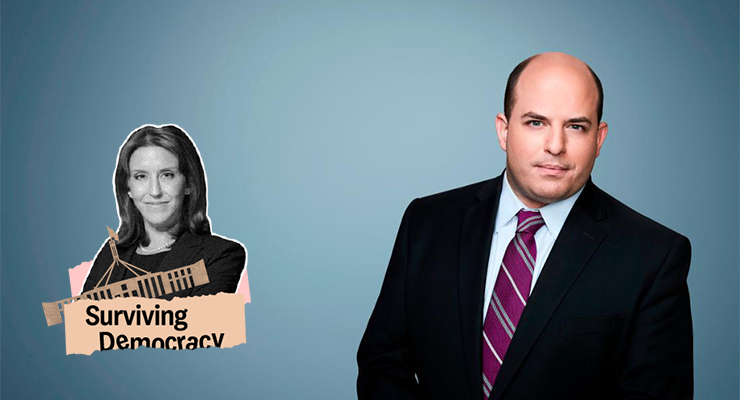
You had to hear it to believe it. Four brilliant minds earnestly canvassing the havoc a Donald Trump presidency could wreak on America’s standing as a democracy. He could appoint toadies in key government jobs and co-opt the military. He might fire civil servants who don’t agree with him and bring the Department of Justice to heel. He could even dangle pardons and openly defy court orders.
“Once he does all those things,” one commentator intoned solemnly, “America … looks the same today for the most part, but it is no longer a liberal democracy with the rule of law.”
Well, they got that right. But here’s the problem: such breathless predictions weren’t made years ago, before Trump first occupied the Oval Office. They were made last week by leading lights in the US think-tank firmament, who seemed to have missed the memo the rest of the world got last year: the United States is no longer the world’s oldest democracy but an anocratic or “hybrid” regime akin to Hungary, Poland and Slovenia.
It gets worse. Last month CNN’s new management sacked Brian Stelter as host of Reliable Sources, the network’s long-running equivalent of Media Watch. His crime? Refusing to give airtime to those who “lie to our faces” and threaten the fourth estate’s ability to perform its role in a functioning democracy.
The following week, the network also exited White House correspondent John Harwood for his unremarkable observation that the current leader of the Republican Party is a “dishonest demagogue”.
The bottom line is simple. The opposite of truth is not alternative facts. It’s lies. And when lies are presented to the public as one “side” of an argument, the end of truth — and the trust the media needs to tell it — is nigh. That was the point Harwood was making when he told CNN’s audience: “We’re brought up to believe there are two different political parties with different points of view, and we don’t take sides in honest disagreements between them. But that’s not what we are talking about. These are [not] honest disagreements. The Republican Party right now is led by a dishonest demagogue.”
Gormless denialism is not the answer. Media consumers have a right to expect their political commentators to be up to speed — emotionally and analytically — with current events and what they mean for democracy, even if those implications are hard, scary or painful for them to face. Qualifying words like “might” and “could” may seem comfortingly moderate, but if accuracy requires “has” and “will”, it is all just sweet talk and lies.
More importantly, sacking people and programs in the name of journalistic values that once governed a world that no longer exists is madness.
While we didn’t appreciate it at the time, the whole concept of “balanced” media coverage presumed a discourse in which democracy was the only acceptable form of governance, and civilised debate the only way to resolve what would only be policy disputes.
Since 2016, such discourse in the US no longer exists — and it may never again if journalists can’t risk calling an autocratic spade a spade for fear of being sacked.








The concept of “balanced” media coverage in America becomes meaningless when one side of the political see-saw is dominated by attention-seeking Trumpist extremists in the GOP like Marjorie Taylor Greene and Lauren Boebert, backed up as they are by longer-serving cynical opportunists like Kevin McCarthy, Marco Rubio, Ted Cruz, Lindsey Graham and Matt Gaetz…all of whom have sold their souls to the orange idiot in order to gain a few votes.
And central to the assault on democratic government has been the decidedly unbalanced reporting of Fox News where the likes of Tucker Carlson, Sean Hannity, Maria Bartiromo and Laura Ingraham have provided a raucous cheer squad for anything the “dishonest demagogue” says or does. Sacking journalists who are prepared to call that out simply stifles the voices of those trying to counter the squawking heads on Fox, and, given the media reach of the Murdochracy, we need every one of those voices.
Blatant lies must be balanced with the truth, and it’s the media’s job to do just that.
Made possible by the removal of the ‘fairness principle’, dumbing down or presenting any issue as a single factor, or a binary i.e. ‘fair & balanced’, when every issue is complicated by multiple factors, but they are disappeared along with deep analysis to allow simple repetitive ‘messaging’.
If there was strong market demand for the kind of balanced, objective news service you’re advocating, couldn’t an entrepreneur service the market by delivering such a service, at a price, earning a small profit that would sustain the service?
If the answer is no, what does that tell you, and where do you go from there?
I think a story on CNN’s new management might be in order if this level of purging is continuing. Motives, connections, plans and modus operandi.
There should be a bias in journalism, and that bias should be towards democracy.
It’s tricky when the media largely runs on a profit making basis and the people paying are often people who no longer want democracy.
well australian media is the same no discourse only positions – ABC versus Sky
I don’t watch Sky so I can’t judge it but I listen to, watch and read the ABC and there is plenty of discourse rather than position taking.
oh, I thought this was going to be about the tutt-tutting the US’s MSM gave Biden for the “sin” of using the word “fascist” when describing parts of the GOP – I mean, come on – are the networks so terrified of losing advertisers?!
yes, yes they are